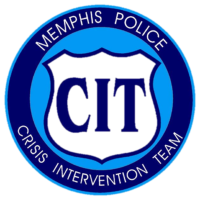ABOUT
CRISIS INTERVENTION TEAM
MISSION
The Crisis Intervention Team (CIT) program is a community partnership working with mental health consumers and family members. Our goal is to set a standard of excellence for our officers with respect to treatment of individuals with mental illness. This is done by establishing individual responsibility for each event and overall accountability for the results. Officers will be provided with the best quality training available, they will be part of a specialized team which can respond to a crisis at any time and they will work with the community to resolve each situation in a manner that shows concern for the citizen’s well being.
OVERVIEW
In 1988, the Memphis Police Department joined in partnership with the Memphis Chapter of the National Alliance on Mental Illness (NAMI), mental health providers, and two local universities (the University of Memphis and the University of Tennessee) in organizing, training, and implementing a specialized unit. This unique and creative alliance was established for the purpose of developing a more intelligent, understandable, and safe approach to mental crisis events. This community effort was the genesis of the Memphis Police Department’s Crisis Intervention Team.
The CIT is made up of volunteer officers from each Uniform Patrol Precinct. CIT officers are called upon to respond to crisis calls that present officers face-to-face with complex issues relating to mental illness. CIT officers also perform their regular duty assignment as patrol officers.
The Memphis Police Department has approximately 268 CIT officers who participate in specialized training under the instructional supervision of mental health providers, family advocates, and mental health consumer groups. Due to the training, CIT officers can, with confidence, offer a more humane and calm approach. These officers maintain a 24 hour, seven day a week coverage.
The CIT Model has been instrumental in offering:
- Special trained officers to respond immediately to crisis calls
- Ongoing training of CIT officers at no expense to the City of Memphis
- Establishments of partnerships of police, National Alliance on Mental Illness/Memphis, mental health providers, and mental health consumers.
- The CIT program is a community effort enjoining both the police and the community together for common goals of safety, understanding, and service to the mentally ill and their families. It is to these goals the Memphis Police Department stands committed.
The CIT program provides an avenue for the development of community partnerships and the collaboration of working together for community interest of service and care. CIT is about doing the right thing for the right reasons. CIT recognizes a special population that deserves special care, treatment, and service. CIT is not about fame, fortune, nor glory, but rather, one of honor and service.
As an innovative program, the CIT model encourages communities, families, law enforcement officers, and mental health professionals to act as a compass for consumers of mental illness. An increase in illegal narcotic/alcohol abuse and the “deinstitutionalzation” of mentally ill citizens has caused many to become homeless and potentially more violent which increases the chances of involvement with law enforcement. This increases the possibility for excessive force complaints and the inevitable backlash from the community.
Traditional police methods, misinformation, and a lack of sensitivity cause fear and frustration for consumers and their families. Too often, officers’ respond to crisis calls where they felt at a disadvantage or were placed in a no-win situation.
Unfortunately, it is usually after a tragedy that police departments look for change. As a proactive program, CIT acts as a model committed to preventing tragic situations and finding “win-win” solutions for all persons concerned.
A response to mentally ill crisis events must be immediate. The National Alliance on Mental Illness/Memphis and the Memphis Police Department agree that an “immediate response” is preferable to that of specialized mental health workers on call or a mobile crisis van response. By offering an immediate humane and calm approach, CIT officers reduce the likelihood of physical confrontations and enhance better patient care. As such, the CIT program is a beginning for the necessary adjustment that law enforcement must make from a traditional police responses to a more humane treatment of individuals with mental illness.
PROGRAM BENEFITS
Since the CIT program began in Memphis, the citizens and the criminal justice system of Memphis have experienced significant benefits of the program. Some of the benefits of the program are listed below:
- Crisis response is immediate
- Arrests and use of force has decreased
- Underserved consumers are identified by officers and provided with care
- Patient violence and use of restraints in the ER has decreased
- Officers are better trained and educated in verbal de-escalation techniques
- Officer’s injuries during crisis events have declined
- Officer recognition and appreciation by the community has increased
- Less “victimless” crime arrests
- Decrease in liability for health care issues in the jail
- Cost savings
- Significant Achievements
National advocates, such as The National Alliance on Mental Illness and The American Association of Suicidology, have recognized the CIT program for distinguished service to the mentally ill. NAMI (Memphis) credits CIT with saving lives and preventing injuries, both for consumers and officers. Officer injury data has decreased by seven-fold since the program inception. University of Tennessee studies have shown that the CIT program has resulted in a decrease in arrests rates for the mentally ill, an impressive rate of diversion into the health care system, and a resulting low rate of mental illness in our jails.
Most importantly, CIT officers give consumers a sense of dignity. This dignity generates a new respect and outlook on the police and the mental health systems.




